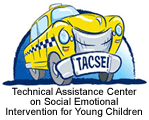

Implementing Effective Practices to Support Young Children’s Social Emotional, Language, and Early Literacy Development
A Collaboration between TACSEI and CELL
Promoting Social Emotional Development |
SHARED PRACTICE |
Promoting Language and Literacy |
| Level 1
- RESPONSIVE RELATIONSHIPS Establishing nurturing and responsive relationships with children and their families is crucial for fostering their development and learning. |
||
| To strengthen the relationship with the child and model responsivity and reciprocity. |
1.1 Greet each child at the door every morning. |
To encourage exploration in expressive and receptive language. |
| To strengthen the relationship with the child, model prosocial behavior, and encourage child sense of self. |
1.2 Address children, always use their names and position myself at their eye level. |
To establish a responsive relationship that supports active participation within early literacy activities. |
| To encourage prosocial behavior, persistence, and mastery by noting child effort, appropriate behavior, caring interactions, following expectations, and accomplishments. |
1.3 Use specific and descriptive encouragement for children’s skills, behavior and activities. |
To support children’s engagement and competence within literacy activities such as shared book reading and writing by using specific and descriptive encouragement. |
| In order to foster prosocial interactions, help the child build relationships with peers, support the child to negotiate peer interactions, and strengthen cooperative interactions. |
1.4 Join children’s play and support/expand their interactions. |
In order to encourage children to try new literacy skills and behaviors provide access to a variety of literacy materials, join in interest-based play, and introduce new information and challenges during active engagement. |
| To provide children with clear directions in the manner that they can understand so that they can meet expectations. When children have behavioral issues, use a calm, positive and supportive tone of voice. |
1.5 Give directions that are short, simple, and specific. Make sure children understand the directions I have given. |
To enhance receptive language and support active participation within early literacy activities, give directions that are short and specific. |
| Encouraging children to share their observations, thoughts, and feelings promotes the development of social competence, confidence in prosocial interactions, and sense of self and personal expression. |
1.6 Respond to children’s comments by asking questions and elaborating on what they say. Have ongoing conversations with children about their ideas and interest. |
To support active engagement and increased literacy knowledge, enhance vocabulary and develop listening comprehension, respond to children’s comments by asking questions and elaborating on what they say. |
| Using individualized supports is critical to ensuring that all children can build relationships with adults and peers and share their thoughts and perspectives. |
1.7 Identify ways to have conversations with children who are non-verbal, language-delayed, or have English as a second language. |
Adults may consider adaptations to the instructions, materials or activities in order to support a child’s ability to communicate and have conversations with others. Some examples are using sign language, pointing or writing. |
| A variety of efforts should occur to share information with families about their children’s strengths and accomplishments and to share information on what families can do to promote social emotional competence. |
1.8 Encourage the involvement of parents and families by offering families practical suggestions for supporting their child’s development. |
To increase the support children have within interest based, everyday literacy activities find different ways to involve parents and families to promote their knowledge of and involvement in early literacy activities. |
| To support caregivers in understanding child’s social emotional development, gain an understanding of family culture and beliefs that might influence social and behavioral expectations, and provide family with support for promoting social emotional development with home and community contexts. |
1.9 Make home visits to strengthen relationships with families and gain an understanding of the child within the family context. |
To support caregivers in providing a variety of early literacy experiences and opportunities to their child such as responding to their child’s interests or providing literacy activities during everyday routines. |
| Share information about community resources related to social emotional development and challenging behavior. |
1.10 Share information about community resources. |
To enhance everyday literacy learning opportunities that may occur within the community, such as the library or park. |
| To strengthen partnership with families and share information on the program and their child’s experiences in the classroom. |
1.11 Use a variety of methods to communicate with families (home visits, phone calls, notes home, newsletter, school websites, email, classroom visits…) |
To strengthen partnership with families and share information regarding early literacy learning, use families preferred communication methods. |